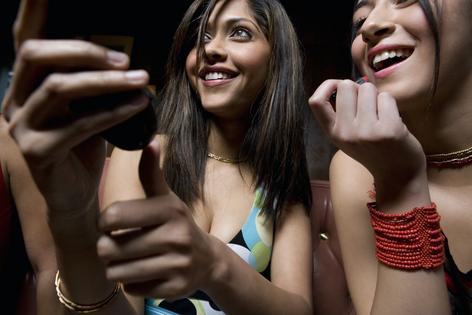The ugly side of beauty: Chemicals in cosmetics threaten college-age women's reproductive health
Published in News & Features
When you walk through the personal care aisles of your local store, you likely see dozens of products that promise to soften your skin, make you smell better, extend your lashes, decrease wrinkling, tame your curly hair, or even semi-permanently change the color of your lips, hair or skin.
Remember the old adage “If it seems too good to be true, it probably is”?
What many people don’t realize is that many of these promises are based on chemicals that can also be hazardous to your health, including endocrine-disrupting chemicals that can interfere with fertility and reproduction, fetal growth, and infant development.
That’s a big concern, because these products are heavily marketed to young women in the years before they might consider starting a family.
Recent studies have demonstrated that college-age women use cosmetic products at higher rates than other groups. Additionally, many of these young women are unaware of the health risks from frequent use of popular products containing contaminants of emerging concern. And finding cleaner alternatives often means paying more.
As an epidemiologist who has fought my own fertility battles, I study exposure to endocrine-disrupting chemicals found in everyday products, such as cosmetics, shampoos, lotions and plastics. I have been working to raise awareness of the health risks to young people and encourage prudent use of cosmetic products.
According to the U.S. Food and Drug Administration, the term “cosmetic” can include deodorants, perfumes, lotions, nail polish, shampoos and other hair products, as well as eye, lip and face makeup.
This is important to know, because unless these products are used to treat a condition, such as dandruff or perspiration, they are not federally regulated in the same way drugs are. That leaves it up to cosmetic companies to decide how to communicate product safety.
Personal care products contain many types of chemicals that manufacturers add for specific purposes, including some that can interfere with or disrupt the normal functioning of the endocrine system. For example, they commonly add UV filters like oxybenzone to protect skin from sun damage, phthalates to enhance fragrance, parabens and triclosan for their antimicrobial properties, and per- and polyfluoroalkyl substances, or PFAS, to enhance durability.
However, not all of these chemicals are present in all products, so figuring out how to avoid exposure can be complicated. For example, in a 2021 review of studies detecting endocrine-disrupting chemicals in daily-use cosmetic products, phthalates were present in perfumes, shower gels, shampoo and nail polish. Parabens were detected in lotions, creams, shampoos, body wash, face cleansers and lipstick. Triclosan was detected in toothpastes, soaps and other cleansers. And UV filters were present in sunscreens, lotions, toothpaste, and lipstick.
Many of these chemicals can co-occur in products, putting consumers at risk of exposure to multiple chemicals at once, and sometimes without warning, as labels do not always list endocrine-disrupting chemicals among the ingredients.
As you rub cosmetic products onto your skin, breathe in their scent or use them to brush your teeth, the chemicals found within can travel throughout your body, targeting your endocrine, nervous and cardiovascular systems.
When these chemicals are endocrine disruptors, such as phthalates, parabens, triclosan and PFAS, they can mimic naturally produced hormones or block hormone receptors. Their presence can result in abnormal hormone production, secretion or transport throughout the body.
These hormonal changes can lead to reproductive problems, including poor sperm quality, miscarriage and endometriosis. They can also lead to thyroid disruption and abnormal growth and development.
Neurological conditions such as attention-deficit/hyperactivity disorder (ADHD), cognitive impairment and depression have also been linked to chemicals added to cosmetic products. So have cardiovascular issues such as high blood pressure, insulin resistance and coronary heart disease.
The level of risk is often difficult to measure and depends in part on the amount of exposure, the type of chemical and how the chemical interacts with the endocrine system. One study of women ages 18-44 in Utah and California found increased exposure to a common phthalate was associated with twice the odds of developing endometriosis, which can be painful and interfere with pregnancy. In a meta-analysis of pregnant women with occupational exposure to endocrine-disrupting chemicals, researchers calculated a 25% increase in the odds of low birth weight when mothers were exposed to more than one type of endocrine-disrupting chemical.
Our study of college-age females found that, on average, young women use eight different personal care products each day that can contain endocrine-disrupting chemicals, but some report as many as 17. This is concerning, as the number of products people use has been linked to higher exposure to endocrine-disrupting chemicals.
Furthermore, 80% of the women we surveyed did not know whether their cosmetic products contained harmful chemicals.
Studies have found significantly higher exposure to phthalates and other chemicals among adolescent girls who wore foundation, blush and mascara than among those who did not. One found that when adolescent girls stopped using products containing endocrine-disrupting chemicals, the concentrations in their urine dropped by as much as 45%.
The European Union has led the way on regulating the use of these chemicals in cosmetic products, with U.S. policies generally lagging behind, but that’s changing.
Washington state recently passed legislation that bans PFAS, lead, phthalates, formaldehyde and other harmful chemicals starting in 2025 and creates new incentives for companies to produce safer products. New York banned mercury, a neurotoxin that can be used as a skin lightener, effective June 1, 2023. California, Minnesota and Maine also have broad restrictions on chemical additives in cosmetics.
While many cosmetic companies offer alternative products without endocrine-disrupting chemicals, they tend to cost more, which can put safer products out of reach of young people. I believe a national ban on the use of harmful chemicals in cosmetic products would be the most equitable means for reducing everyone’s exposure.
This article is republished from The Conversation, an independent nonprofit news site dedicated to sharing ideas from academic experts. The Conversation is trustworthy news from experts, from an independent nonprofit. Try our free newsletters.
Read more:
Body lotions, mothballs, cleaning fluids and other widely used products contain known toxic chemicals, study finds
What are PFAS, and why is the EPA warning about them in drinking water? An environmental health scientist explains
Leslie Hart receives funding from The National Institute of Environmental Health Sciences.













Comments